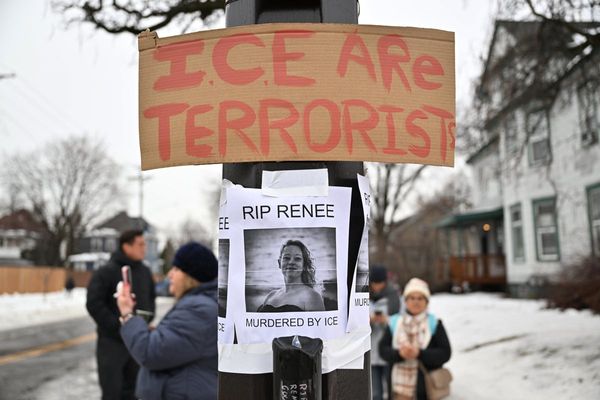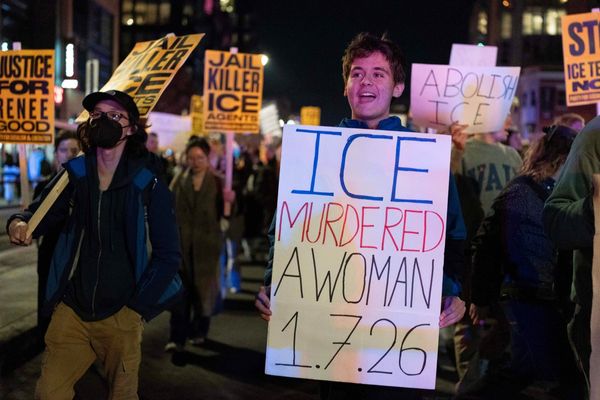
The week had started well for the Palestine Solidarity Campaign (PSC). Keir Starmer had finally backed calls for an immediate ceasefire between Israel and Hamas and the Prince of Wales had raised his concerns about the appalling loss of life in Gaza.
But on Saturday, as more than 200 people gathered at Conway Hall in London for the campaign’s annual general meeting, optimism that the debate over the Middle East might be turning the PSC’s way had been superseded by puzzlement – and some anger.
“It’s not extremist to be against the war,” said Fiona Goldie, an activist from Carlisle in Cumbria. “It’s the norm to want peace.”
She was referring to suggestions that pro-Palestinian activists like her had been in some way responsible for the chaotic scenes that had unfolded inside the House of Commons on Wednesday and Thursday, during a debate on the Middle East conflict.
For months MPs have reported feeling intimidated by pro-Palestinian activists in their constituencies and online. The murder in October 2021 in Essex of the Tory MP David Amess by an Islamist extremist remains fresh in their minds. But last week the accusations against pro-Palestinian campaigners widened.
The front page of Saturday’s Times reported that the PSC had been trying to sabotage British democracy, no less, and force parliament into lockdown to advance its cause.
Goldie, and others with her, seemed anything but extreme in their methods or views as they went about their business yesterday.

She told how she and friends had handed out leaflets for months in Carlisle town centre most Saturday lunchtimes. The public, she insisted, was “overwhelmingly sympathetic”. “The feedback we get from somewhere as non-political as Carlisle is that people are outraged. They want our government to do something.”
But with feelings over events in Gaza running high, and as the UK heads towards a general election that has increased the heat of the conflict between parties in the House of Commons, arguments over Israel and Gaza have become entangled with domestic Westminster politics and the entire debate has turned toxic.
On Friday, the twice-sacked Tory home secretary, Suella Braverman, claimed that “Islamist cranks and leftwing extremists” had taken control of the UK’s streets. It was all part of a leftwing agenda, she said. The Conservative MP Lee Anderson said Islamists had “got control of London” and that its Labour mayor, Sadiq Khan had “given our capital city away to his mates”.
Many of those heading through the winter sunshine towards Conway Hall wore the keffiyeh, the black and white scarf that has come to symbolise the Palestinian cause.
But Roshan Pedder, from Surrey, proudly showed off her African National Congress scarf, as a symbol of hope, and to demonstrate that those who had come to the meeting were from a long and wide tradition of peace campaigning. “We faced down Reagan and Thatcher [who were] holding out to the bitter end against sanctions,” she said. “And we pressed and pressed and pressed and eventually it burst.”
Pedder rejected the idea that demonstrating outside an MP’s office was wrong. “I don’t see how it can be intimidating as long as it’s peaceful,” she said. “Isn’t talking to our MPs what we’re supposed to do in a democracy?”

On Thursday morning, British democracy was very much in the frame. After 24 hours of furious and unseemly argument over the handling of a debate in the House of Commons on a Gaza ceasefire by the speaker, Sir Lindsay Hoyle, the veteran Labour MP Barry Sheerman rose to declare the behaviour of his colleagues a disgrace.
Vicious political point-scoring had drowned out serious debate on events in Gaza, and whether calling for a ceasefire was now the best way forward. “It was shameful that the BBC had to blank off the proceedings at one stage because of the crude and vile language that was coming from one end of the chamber,” said Sheerman.
A senior Tory MP roamed the Commons corridors in a state of fury at the way the house had failed to conduct a civilised, serious and dignified discussions on the Israel-Gaza question, of all issues.
“It is a fucking disgrace. We are now in a row with ourselves, among ourselves, debating whether to kick out the speaker of the House of Commons, rather than the issue at hand, which could not be more serious. It is the most depressing day of my life as an MP.”
Hoyle’s troubles had begun the previous morning, when he decided to go against the advice of his own officials and select a Labour amendment, as well as a government one, to an SNP opposition day motion calling for a ceasefire between Israel and Hamas. Normally only the government can put down an amendment to an opposition day motion but Hoyle had gone out on a limb.
The SNP’s motion was for an immediate, unconditional ceasefire, with the onus on Israel, and it mentioned what it called the Netanyahu government’s “collective punishment” of Palestinians. Labour’s amendment, meanwhile, was for an “immediate, humanitarian ceasefire” observed by all. It condemned the terrorism of Hamas, while also demanding the release of hostages, and calling on Israel to stop its bombardment. The government amendment did not call for an immediate ceasefire but put the emphasis on a humanitarian pause to the conflict, working towards a ceasefire.

Hoyle, who used to sit on the Labour benches before becoming speaker, had, as a result, left himself wide open to accusations of pro-Labour bias, and of helping Starmer avoid the damaging prospect of seeing many of his pro-ceasefire MPs rebel by voting for the SNP motion calling for an unconditional and immediate ceasefire.
Many Labour MPs felt under pressure from constituents to show they backed a ceasefire. If Labour’s own amendment wasn’t selected, backing the SNP motion would have been the only way to answer those voters. One senior Labour MP said: “Everyone knew that the SNP had chosen the issue of a Gaza ceasefire for their opposition day solely to expose splits on our side. It was entirely cynical on their part. I think Hoyle was right to do what he did. Opposition days are supposed to be occasions when the opposition parties criticise the government. This SNP opposition day was different. It was designed to attack Labour.”
If no Labour amendment had been allowed, and Starmer had been left to whip his MPs to abstain, this could have seen mass resignations, as happened with the likes of Jess Phillips when a similar situation occurred last November.
“The situation was really tense at the top,” said one Labour source. “There were fears that at least two shadow cabinet members would have resigned. There would have been a big rebellion that would have seriously damaged Keir.”
There were reports, denied by Labour and Hoyle, that with this in mind team Starmer had made clear to the speaker that the party would not back his re-election at the start of the next parliament unless he called the Labour amendment.

What ensued was undignified chaos as Hoyle felt the full force of Tory and SNP fury. Both parties had in interest in exposing Labour splits.
When the clerk of the house, Tom Goldsmith, wrote an official note for publication to record that the speaker had gone against convention and his advice, the Tories withdrew from the process and the votes. Labour’s amendment passed and the SNP motion was never voted on, though it had been its opposition day in the first place. Immediately SNP MPs suggested that Hoyle’s position was untenable.
On Wednesday night there were rowdy scenes, worse than any many could recall. Penny Mordaunt, leader of the House of Commons, desperate to score political points, accused the speaker of having “hijacked” the debate and “undermined the confidence of the Commons.”
The SNP milked the occasion for all it was worth, saying the whole episode had shown the contempt with which Westminster regarded Scotland’s ruling party and the third biggest party in the Commons. “We have seen the SNP opposition day turn into a Labour opposition day and I’m afraid that that is treating myself and my colleagues in the Scottish National party with complete and utter contempt,” said Stephen Flynn, the SNP’s leader at Westminster.
On Thursday, a tearful and clearly sleep-deprived Hoyle made his second apology to the house in 12 hours for what he admitted had been a serious error of judgment.
“I apologise to the House. I made a mistake: we do make mistakes and I own up to mine.” But he made clear that in doing what he did he had had in mind the interests of all MPs, and that he had felt that those would be best served by allowing two amendments, Tory and Labour, as well the SNP motion, so all the main party positions could be laid out, Labour’s included.

It had been for the very best of reasons, he said, to help not fan the flames. “I will defend every member in this House. Every member matters to me in this House. As has been said, I never, ever want to go through a situation where I pick up a phone to find a friend, on whatever side, has been murdered by a terrorist. I also do not want another [terrorist] attack on this House – I was in the chair on that day. I have seen, I have witnessed. I will not share the details, but the details of the things that have been brought to me are absolutely frightening for all members of the House, on all sides. I have a duty of care and I say that. If my mistake is looking after members, I am guilty.”
This weekend, although more than 70 MPs have signed a motion expressing no confidence in the speaker, their efforts to oust him seem to have stalled, at least for now. Plenty of rightwing Tories have swung behind him, including the veteran Sir Edward Leigh, who said it was time to move on and have another debate as soon as possible on a government motion, with all amendments considered “to restore our reputation as soon as possible”.
Back at Conway Hall on Saturday, Pedder wondered how ordinary people could get their voices through. Referring to the behaviour of the main parties and their MPs, she said: “These were people applying archaic rules that nobody understood. We have a system that does not allow the public voice to enter parliament. MPs were looking after their vote banks instead of looking at the genocide – there’s no other word for it – in Gaza, and the injustices over the last 75 years that the Palestinian people have suffered.”







